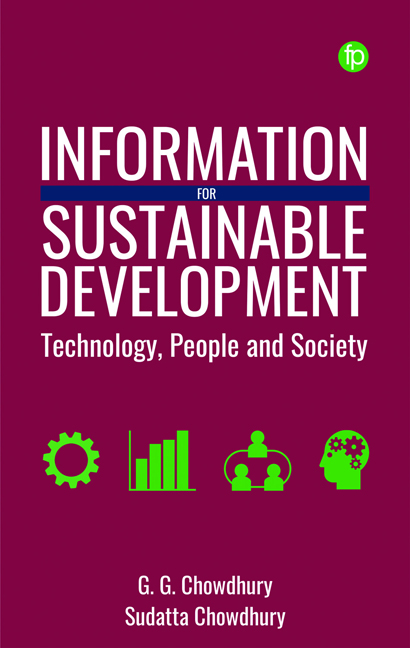Book contents
- Frontmatter
- Dedication
- Contents
- Figures
- Tables
- About the Authors
- Introduction
- 1 Data, Information, People and Society
- 2 Information and the Sustainable Development Goals
- 3 Sustainable Development Goals: Targets and Indicators
- 4 Data, Information and Progress in SDGs
- 5 Capacity, Co-operation and Sharing of Data for SDGs
- 6 People and the SDGs: the Digital Divide
- 7 People and the SDGs: Access to Data and Digital Skills
- 8 Information Skills and the SDGs in Everyday Life
- 9 Information, Education and Sustainable Development
- 10 Research and Development Around the SDGs
- 11 Information Education, Research and Professional Developments Around SDGs
- References
- Index
Introduction
Published online by Cambridge University Press: 13 April 2024
- Frontmatter
- Dedication
- Contents
- Figures
- Tables
- About the Authors
- Introduction
- 1 Data, Information, People and Society
- 2 Information and the Sustainable Development Goals
- 3 Sustainable Development Goals: Targets and Indicators
- 4 Data, Information and Progress in SDGs
- 5 Capacity, Co-operation and Sharing of Data for SDGs
- 6 People and the SDGs: the Digital Divide
- 7 People and the SDGs: Access to Data and Digital Skills
- 8 Information Skills and the SDGs in Everyday Life
- 9 Information, Education and Sustainable Development
- 10 Research and Development Around the SDGs
- 11 Information Education, Research and Professional Developments Around SDGs
- References
- Index
Summary
The Sustainable Development Goals (SDGs) that were proposed by the United Nations (UN) and adopted as UN Resolution A/RES/66/288 in 2015 are a set of 17 universal Goals and 169 associated Targets that have implications for everyone in every country and society, at present and in the future. Consequently, countries around the world signed up to the UN Resolution, accepting and agreeing to work towards achieving the Targets of the SDGs by 2030. Numerous reports, research papers, books and web resources have since appeared, discussing the benefits, progress, challenges and needs for co-operation and collaboration for achieving the SDGs that touch upon almost everything in each country, each society and each individual in the world.
This book offers an information science perspective on measuring the performance and assessing progress in achieving the SDGs. The primary focus is on the role and use of data, metadata and information in measuring the achievements and progress in different SDGs, and the standards and tools developed by international and national agencies to support this work. The book introduces the concepts and principles of information science and data management to people without a specialist background in those areas and similarly promises an introduction to the concepts and principles of sustainable development and sustainable information, before moving on to consider the current state of collection, management and use of different kinds of data for the SDGs at global and national levels, followed by chapters dealing with particular issues and specific Goals and Targets.
Overall, the book discusses the role and importance of data, information, people and society in achieving the Targets of the SDGs. It discusses the different types of metadata required for capturing data and information related to the Targets of different SDGs and various associated challenges, such as data availability and completeness, and even challenges associated with metadata and data collection, such as qualitative versus quantitative data for some Targets and Indicators. Appropriate data, charts and tables have been used from different reports and statistics from the various UN agencies, OECD and EU, as well as national agencies such as the ONS (Office for National Statistics) in the UK.
- Type
- Chapter
- Information
- Information for Sustainable DevelopmentTechnology, People and Society, pp. xxi - xxivPublisher: FacetPrint publication year: 2024

